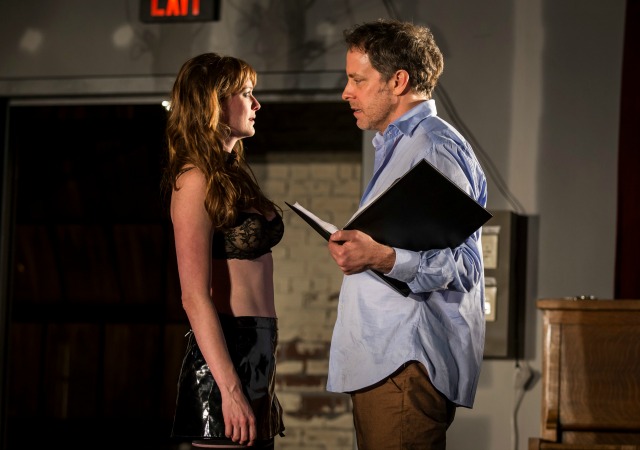A Deliciously Dynamic 'Venus in Fur'
By Melody Udell in Arts & Entertainment on Mar 26, 2014 6:20PM

Venus in Fur at the Goodman. Photo by Liz Lauren.
The Goodman’s production of Venus in Fur starts off innocently enough. We’re in an industrial loft in present day New York, where aspiring playwright/director Thomas (Rufus Collins) is wrapping up a long day auditioning actors for his new work, which is adapted from the 19th century erotic novel by Austrian writer Leopold von Sacher-Masoch. (This author and his novel, it turns out, inspired the word “masochism.”) In comes Vanda (Amanda Drinkall), several hours late and seemingly ill prepared to audition for the play’s lead, a sultry, headstrong sex symbol whose lover begs to be dominated by her. After sizing up the loud-mouthed, ungainly Vanda, it’s clear to Thomas that the only thing she shares with the main character in his play is a first name, which he chalks up to odd coincidence. But after stubbornly convincing Thomas to read a scene with her, Vanda gives a surprisingly good audition—it’s clear her sailor mouth and flakiness are hiding a more complex persona within.
As the play progresses, it turns into a play-within-a-play of sorts, Thomas and Vanda pore over the script and even brainstorm a few of the scenes. Vanda, it turns out, is more than just passingly familiar with the work. As the power struggle and sexual politics between the characters in the script become more intense, so, too, does the power struggle between Thomas and Vanda.
As Vanda, Drinkall transitions easily between seemingly shallow actor and her alter ego, a power-wielding dominatrix. The role turned Nina Arianda, who originated Vanda, into a star when the play debuted on Broadway in 2011. While Drinkall doesn’t quite have the texture—that earned confidence—that won Arianda a Tony for best actress, Drinkall brings a fresh hint of vulnerability to the role. Playwright David Ives clearly left his main character intentionally ambiguous; Vanda and her motives are almost maddeningly opaque. Is she the vapid, forgettable actress she first seemed, or the effortlessly sensual character in the play? Or perhaps she’s something else altogether. Regardless, Drinkall is clearly adept at spinning her character (and character-within-a-character) from madcap to masochism with ease.
Rufus Collins is winning as Thomas, whose thinly veiled arrogance is challenged when he meets Vanda. The two have the requisite chemistry, transitioning between scenes that feel largely pedantic—thanks to Thomas' intolerable intellectualism—to moments of stifling sensuality. In a two-person show, there’s always the potential for lag time, but director Joanie Schultz keeps the energy up—Thomas and Vanda zip around the stage in a near-breathless pace.
Ives' play is a heady whirlwind of a show, stuffed full of ambiguity and intrigue. In fact, it’s just the type of show that inspires lengthy post-show discussion. A whip-smart script and capable performers keep the audience charged up, expecting the unexpected—and ensuring the Goodman’s production gives off an electricity all its own. Hail Aphrodite, indeed.
The show runs through Sunday, April 13 at the Goodman, 170 N. Dearborn, 312-443-3800 or online.